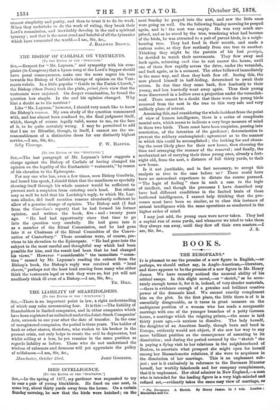BIRD INTELLIGENCE.
[TO THE EDITOR OF THE " SPECTATOR."] SIR,—In the spring of 1877, my gardener was requested to try to rear a pair of young blackbirds. He fixed on one nest, in some ivy, about thirty yards away from the house. On a certain Sunday morning, he saw that the birds were hatched ; on the
next Sunday he peeped into the nest, and saw the little ones were going on well. On the following Sunday morning he peeped again, and lo ! the nest was empty. He was very much sur- prised, and as he stood by the tree, wondering what had become of the birds, be was attracted to a pair of parent birds, in a neigh- bouring tree. They had food in their mouth, and made a curious noise, as they flew restlessly from one tree to another. Thinking they might be the parents of his lost protege's, he decided to watch their movements. They flew away and back again, returning each time to rest nearer the house, until one of them flew rapidly across the drive, under the verandah, and back again, as in a moment. The other followed immediately in the same way, and then they both flew off. Seeing this, the man placed himself in half-hiding, determined to await their return. In due time they came back, flew fearlessly to their young, and less hurriedly went away again. Thus their young were discovered in a hollow over a projection under the verandah- roof. There cannot be a doubt that these were the young birds removed from the nest in the tree to this very safe and very unlikely place of retreat.
Assuming this, and considering the whole incident from the point of view of human intelligence, there is a series of complicate mental acts, which seems to indicate a very large measure of mind in these two birds. There must have been suspicion, passing into conviction, of the intention of the gardener ; determination to prevent the robbery contemplated ; agreement as to the manner in which this could be accomplished ; the looking for and choos- ing the most likely place for their new home, then choosing the- time and arranging the manner of the removal ; and finally, the mechanical act of carrying their three young ones, already a fort- night old, from the nest, a distance of full thirty yards, to their new home.
Is it not justifiable, and in fact necessary, to accept this analysis as true to the case before us ? There could have been no antecedent experience to dictate the course pursued. " The logic of feeling " rises in such a case to the logic- of intellect, and though the processes 1 have described may have had different conditions in the limited brain of these feathered intelligences, I cannot help thinking that the pro- cesses must have been so similar, as to class this instance of animal intelligence with the same operations as conducted in the higher order of mind.
I may just add, the young ones were never taken. They had a capital run of some yards, and whenever we tried to take them they always ran away, until they flew off their own masters.—I


































 Previous page
Previous page